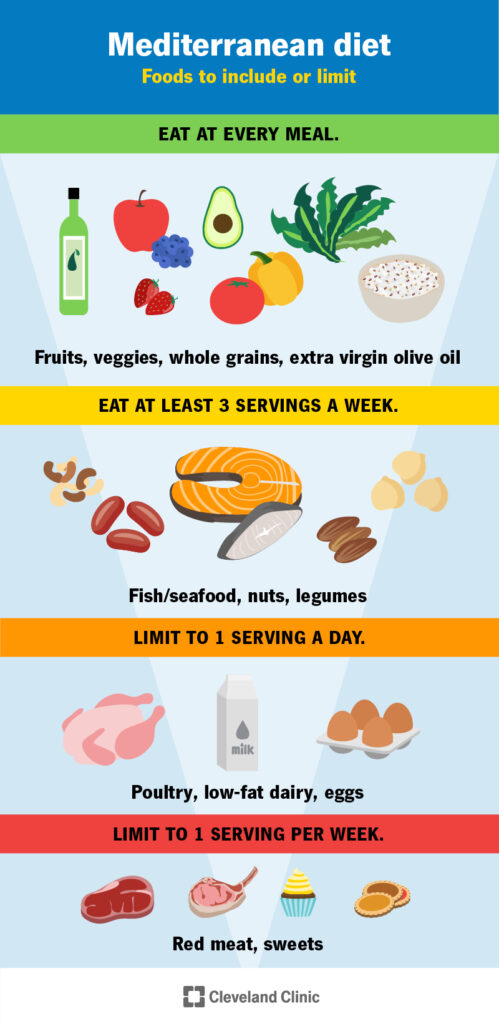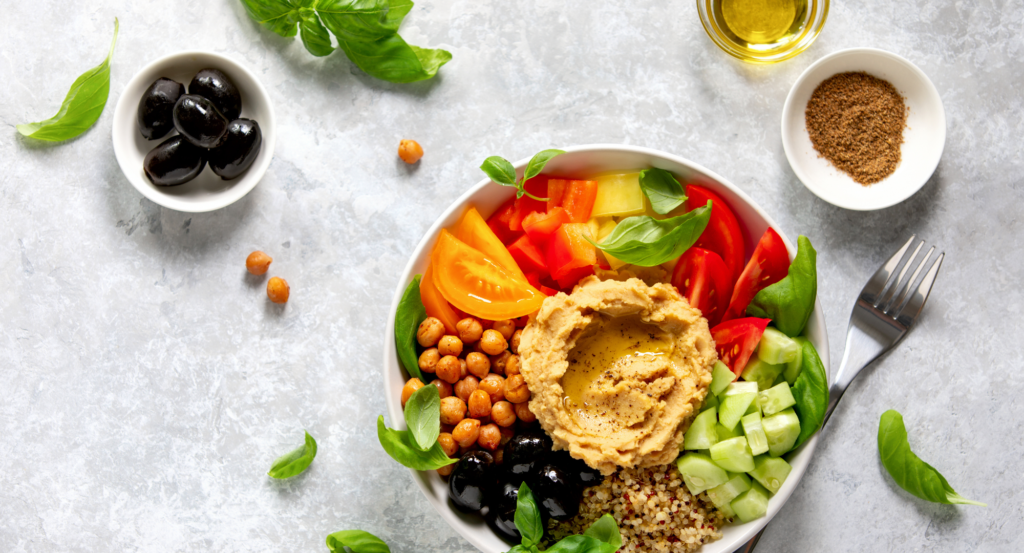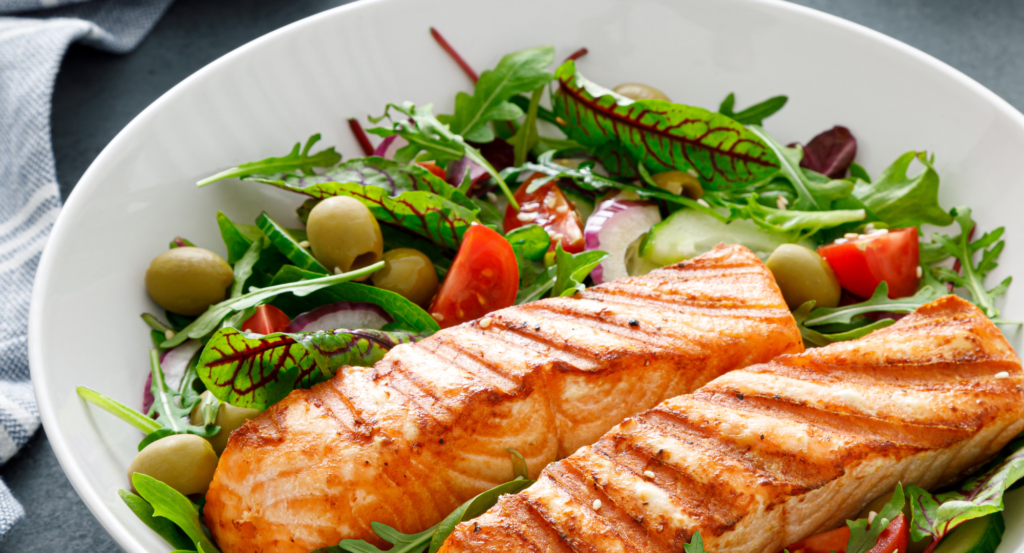Mediterranean Diet
One of the Highest Ranked Diets According to the US News and World Report Annual Rankings
What is the Mediterranean Diet?
The Mediterranean diet is characterized by an emphasis on plant-based foods such as fruits, vegetables, whole grains, nuts, and legumes, alongside moderate consumption of fish, poultry, and dairy.
It also incorporates healthy fats, particularly olive oil, while limiting red meat and sweets. Research suggests that following the Mediterranean diet can reduce the risk of heart disease, promote weight loss, and improve overall health due to its rich nutrient profile and emphasis on whole, minimally processed foods.
Some of the benefits of the Mediterranean Diet include:
- Reduced risk of heart disease: The diet’s emphasis on healthy fats, fruits, vegetables, and whole grains can lower cholesterol and blood pressure.
- Improved cognitive function: Consuming foods rich in antioxidants and omega-3 fatty acids, such as fish and olive oil, may support brain health and reduce the risk of cognitive decline.
- Weight management: The diet’s focus on whole, nutrient-dense foods and moderate portions can aid in weight loss and weight maintenance.
- Lower risk of diabetes: High fiber content from fruits, vegetables, and whole grains, coupled with healthy fat sources, can help regulate blood sugar levels and reduce the risk of type 2 diabetes.
- Enhanced longevity: The Mediterranean diet’s association with reduced inflammation, improved heart health, and overall balanced nutrition may contribute to a longer, healthier life.

Image Source: Cleveland Clinic (https://my.clevelandclinic.org/health/articles/16037-mediterranean-diet)
Change How You Eat, Change Your Life
So what are the basics of the Mediterranean Diet? Multiple studies have consistently demonstrated the effectiveness of the Mediterranean diet in promoting weight loss and overall health. Its nutrient-rich composition has been linked to various health benefits, including improved heart health and longevity.
These tips will guide in you implementing the Mediterranean diet in your lifestyle:
Increase your intake of fruits and vegetables. Aim for 2 to 3 servings of fruit and at least four servings of vegetables daily. A serving of fruit is equivalent to a medium-sized piece or one cup chopped, while a serving of vegetables equals two cups leafy greens, one cup raw, or half a cup cooked.
Opt for whole grains like whole-grain bread, cereal, pasta, bulgur, barley, or farro. Aim for at least 3 ounces of whole grains daily if you consume around 2,000 calories. Check the Nutrition Facts label for serving sizes.
Choose unsaturated fats from plant sources like olive, canola, or safflower oil instead of saturated fats. Replace butter with these oils in cooking or on bread, and consider nut or seed spreads as alternatives.
- Incorporate raw, unsalted nuts into your meals, aiming for four servings weekly (a quarter cup per serving).
- Include seafood in your diet 2 to 3 times a week, opting for varieties like tuna, salmon, trout, mackerel, or herring. Be mindful of mercury levels, especially for children and pregnant or breastfeeding individuals. A serving size for adults is 3 to 5 ounces.
Choose low-fat dairy options like skim or 1% milk, low-fat cottage cheese, or Greek yogurt. Limit cheese intake to a serving about the size of four dice, and reduce higher-fat dairy products like whole milk and butter.
Decrease consumption of red and processed meats, opting instead for fish, poultry, or beans. Choose lean cuts of meat and trim visible fat before cooking.
Enhance flavor with herbs and spices instead of excessive salt. This will reduce sodium intake while adding depth to your meals.

Guidelines for Healthy Eating: Foods to Include or Limit
Top 10 Foods to Seek Out
- Olive oil: A cornerstone of the Mediterranean diet, rich in heart-healthy monounsaturated fats and antioxidants.
- Fruits: Including a wide array of fresh fruits such as oranges, berries, grapes, and figs, providing vitamins, minerals, and dietary fiber.
- Vegetables: Emphasizing leafy greens, tomatoes, cucumbers, peppers, and eggplants, offering essential nutrients and antioxidants.
- Whole grains: Such as whole wheat bread, brown rice, quinoa, and bulgur, providing fiber, vitamins, and minerals while promoting satiety.
- Legumes: Including beans, lentils, and chickpeas, rich in protein, fiber, and various nutrients, while also contributing to heart health.
- Nuts and seeds: Such as almonds, walnuts, and flaxseeds, offering healthy fats, protein, and micronutrients like magnesium and vitamin E.
- Fish and seafood: Especially fatty fish like salmon, sardines, and mackerel, providing omega-3 fatty acids crucial for heart and brain health.
- Poultry: Including chicken and turkey, providing lean protein sources that can be enjoyed in moderation.
- Dairy: Mainly in the form of yogurt and cheese, offering calcium, protein, and probiotics, though typically consumed in smaller amounts.
- Herbs and spices: Such as basil, oregano, garlic, and cinnamon, used to flavor dishes and provide additional health benefits, while reducing the need for excess salt.
6 Foods to Limit or Avoid
Processed meats: High in saturated fats and sodium, associated with heart disease and cancer risks.
Refined grains: Low in fiber and nutrients, leading to blood sugar spikes and less sustained energy.
Added sugars: Found in sugary drinks and snacks, contributing to weight gain and inflammation.Saturated and trans fats: Increase LDL cholesterol levels, raising heart disease risks.
Excessive alcohol: Beyond moderation, may lead to liver issues and other health concerns.
Sweetened beverages: Empty calories promote weight gain and metabolic problems.
Highly processed foods: Loaded with unhealthy fats, sugars, and additives, lacking nutritional value.

Weekly Meal Plan Example
Breakfast
Lunch
Dinner
Day 1
Greek yogurt topped with mixed berries and a sprinkle of chopped nuts, whole grain toast with avocado slices.
Mediterranean salad with mixed greens, tomatoes, cucumbers, olives, feta cheese, and grilled chicken, drizzled with olive oil and balsamic vinegar.
Baked salmon seasoned with lemon and herbs, quinoa pilaf with roasted vegetables (bell peppers, zucchini, and onions), steamed broccoli.
Day 2
Whole grain oatmeal topped with sliced banana, almonds, and a drizzle of honey, served with a side of fresh orange slices.
Whole grain pita stuffed with hummus, sliced cucumbers, tomatoes, and shredded lettuce, served with a side of tabbouleh salad.
Grilled shrimp skewers with a side of couscous mixed with diced tomatoes, parsley, and lemon juice, roasted asparagus.
Day 3
Veggie omelette made with eggs, spinach, tomatoes, and feta cheese, served with whole grain toast.
Mediterranean wrap with grilled vegetables, chickpeas, feta cheese, and a drizzle of tahini sauce, served with a side of Greek salad.
Baked chicken breast with rosemary and garlic, quinoa stuffed bell peppers, steamed green beans.
Day 4
Whole grain toast topped with mashed avocado and sliced hard-boiled eggs, served with a side of sliced strawberries.
Lentil and vegetable soup, whole grain roll, mixed green salad with olive oil and lemon dressing.
Grilled lamb chops with mint yogurt sauce, roasted sweet potatoes, sautéed spinach with garlic.
Day 5
Greek yogurt parfait layered with granola, sliced peaches, and a drizzle of honey.
Whole grain pasta salad with cherry tomatoes, bell peppers, olives, artichoke hearts, and grilled chicken, tossed in a lemon-herb vinaigrette.
Baked white fish (such as cod or tilapia) with a tomato and olive tapenade, quinoa pilaf with roasted vegetables, steamed broccoli.
Day 6
Smoothie made with spinach, banana, frozen berries, Greek yogurt, and almond milk, served with a side of whole grain toast.
Falafel salad bowl with mixed greens, quinoa, cucumber, tomato, olives, and a dollop of tzatziki sauce.
Grilled vegetable kebabs (zucchini, mushrooms, cherry tomatoes) served with herbed couscous, Greek salad.
Day 7
Whole grain waffles topped with fresh mixed berries and a dollop of Greek yogurt.
Mediterranean-style tuna salad with white beans, red onion, cherry tomatoes, and parsley, served over mixed greens.
Mediterranean vegetable stew with chickpeas and diced tomatoes, served with whole grain garlic bread.
Want to Learn More?
So what are the basics of the Mediterranean Diet? Multiple studies have consistently demonstrated the effectiveness of the Mediterranean diet in promoting weight loss and overall health. Its nutrient-rich composition has been linked to various health benefits, including improved heart health and longevity.
These tips will guide in you implementing the Mediterranean diet in your lifestyle:
- Mayo Clinic – “Mediterranean Diet for Heart Health” (https://www.mayoclinic.org/healthy-lifestyle/nutrition-and-healthy-eating/in-depth/mediterranean-diet/art-20047801 )
- Harvard Health – “A Practical Guide to the Mediterranean Diet” (https://www.health.harvard.edu/blog/a-practical-guide-to-the-mediterranean-diet-2019032116194)
- Cleveland Clinic – “Mediterranean Diet” (https://my.clevelandclinic.org/health/articles/16037-mediterranean-diet)
- American Heart Association – “What is the Mediterranean Diet?” (https://www.heart.org/en/healthy-living/healthy-eating/eat-smart/nutrition-basics/mediterranean-diet)
